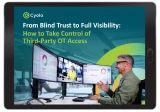Cyolo’s global survey examines how industrial organizations are managing access and risk in the face of unprecedented challenges.
Mountain View, Calif. — Feb. 21, 2024 — Today, Cyolo, the access company for the digital enterprise, in partnership with Ponemon Institute, released a global study exploring how organizations that operate critical infrastructure, industrial control systems (ICS), and other operational technology (OT) systems are managing access and risk in an era of rising connectivity.
“Our world has become increasingly interconnected, and the findings of this report highlight the vital need for organizations to reevaluate and enhance their strategies for ensuring secure access into OT environments,” said Larry Ponemon, Chairman and Founder of the Ponemon Institute.
The report, “Managing Access & Risk in the Increasingly Connected Operational Technology (OT) Environment,” reveals that many industrial organizations lack the resources, expertise, and collaborative processes to effectively mitigate threats and ensure secure access to OT systems. The report is based on a survey of 1,056 security professionals across the United States and EMEA who work in organizations that run an OT environment and are knowledgeable about their organization’s approach to managing OT security and risk.
Ensuring secure access to OT environments is about more than just cybersecurity. These environments contain highly sensitive systems and critical infrastructure responsible for keeping manufacturing lines running, water and electricity flowing, and performing other tasks vital to the smooth functioning of our communities.
OT systems were historically isolated for security reasons but are now facing increased connectivity to IT networks and the internet (sometimes called IT/OT convergence). At the same time, more third-party vendors and contractors are being given remote access to OT environments. These shifts introduce serious new risks that can leave organizations exposed to safety and security threats if access and connectivity are not properly controlled.
Overall key findings include:
Organizations allow dozens of third-party users to access OT environments. 73% permit third-party access to OT environments, with an average of 77 third parties per organization granted such access. Challenges to securing third-party access include preventing unauthorized access (44%), aligning IT and OT security priorities (43%), and giving users too much privileged access (35 percent).
Visibility into industrial assets is dismal. 73% lack an authoritative OT asset inventory, putting organizations at significant risk.
IT and OT teams share responsibility for OT security but do not communicate enough to achieve optimal outcomes. 71% report that IT or IT and OT together are responsible for securing OT environments. However, collaboration and communication are lacking, with 37% reporting little or no collaboration, and 19% reporting that teams talk about OT security issues only when an incident occurs.
Security is seen not only as a goal of IT/OT convergence but also as an obstacle. Reducing security risk is the top objective of companies pursuing IT/OT convergence (59%), and yet one-third (33%) of organizations not pursuing convergence cite security risk as a top factor for their decision.
“We are at a crucial point in the evolution of OT security, and the need to secure access to critical systems from internal and external threats is more urgent than ever. The stakes are exceptionally high, as a breach could jeopardize not just data but also the functioning of critical infrastructure, risking the safety of workers and the environment,” said Joe O'Donnell, Executive Vice President of Corporate Development and General Manager of OT at Cyolo. “This research reveals a pressing need for new approaches, especially in areas like third-party and privileged access, the security of legacy systems, and collaboration between IT and OT teams. Cyolo is dedicated to supporting organizations in navigating these challenges and working towards a secure, resilient future for OT environments.”
Access the full report here.
For additional insights, register now to attend a joint webinar from Cyolo and Ponemon Institute, to be held on Tuesday, March 12 at 11am ET. During this session Dr. Larry Ponemon will share top findings from the research, with industry analysis added by Cyolo’s Joe O’Donnell and Adi Karisik, Global Principle for OT Cybersecurity at Jacobs Engineering.
About Cyolo
Cyolo enables privileged remote operations by connecting verified identities directly to applications with continuous authorization throughout the connection. Purpose-built for deployment in every type of environment, Cyolo’s Remote Privileged Access Management (RPAM) solution combines multiple security functions required to mitigate high risk access, including zero-trust access for users and devices, MFA for the last mile, IdP capabilities, credentials vault, secure file transfer, supervised access, session recording, and much more into a single, cost-effective, easy to deploy, and user-friendly platform.
Consolidate your security stack and experience the power of seamless and secure operations across any application in any environment, from critical infrastructure to cloud. Visit https://cyolo.io/ to learn more.
About Ponemon Institute
Ponemon Institute is dedicated to independent research and education that advances responsible information and privacy management practices within business and government. Our mission is to conduct high quality, empirical studies on critical issues affecting the management and security of sensitive information about people and organizations. We uphold strict data confidentiality, privacy and ethical research standards. We do not collect any personally identifiable information from individuals (or company identifiable information in our business research). Furthermore, we have strict quality standards to ensure that subjects are not asked extraneous, irrelevant or improper questions.
Media Contact
Cyolo Media Inquiries
10Fold
cyolo@10Fold.com

Subscribe to Our Newsletter







